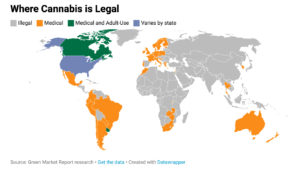Business
International Cannabis Reform Ramps Up In Europe, South America

The majority of the world appears to be moving towards some form of cannabis regulation, with an eye towards liberalization.
Global cannabis reform is gaining momentum. What started as a ripple in three countries has become a global policy movement.
While many countries, primarily in Africa and Asia, continue to ban cannabis, a hotbed of reform activity is transpiring everywhere else.
Stateside, U.S. cannabis advocates continue to push for federal and local reform. Simultaneously, notable international cases, including that of WNBA star Brittney Griner, remind us that even though reform is underway, it is far from the endpoint proponents would like to reach.
International Reform Gaining Steam
Global cannabis reform continues to gain momentum via various regulatory frameworks and proposals.

“The majority of the world appears to be moving towards some form of cannabis regulation, with an eye towards liberalization,” said Jason Adelstone, an associate attorney for Vicente Sederberg.
Adelstone, whose focus areas include cannabis compliance and international policy, added, “What those systems look like can vary greatly.”
Depending on the nation, programs vary from permissive medical regulations to heavily regulated, GMP-style pharmaceutical markets. Medical and export-only models, such as that seen in Lesotho, are popular legislative approaches. In South Korea, cannabis-based drugs Epidiolex and Sativex are approved in some instances.
Mexico and South Africa have taken different approaches, legalizing cannabis via Supreme Court rulings. Neither passed laws through their legislative bodies.
Lewis Koski, chief strategy officer for Metrc, believes the approaches being taken by Malta and Luxembourg could offer an alternative model with credentialed companies spanning cultivators to social clubs. Both countries passed reform laws in 2021.
While activity continues, demand for information is reportedly growing before significant change is made in other markets. “There’s a real interest in hearing from other countries, companies, and experts that have experienced it differently around the world,” Koski said.
Right now, all eyes are on Germany. Proposed regulations were released and approved by the Federal Cabinet earlier in November, but reform efforts could be halted by the European Union, where politicians opposed to legalization have been lobbying against the measure.
Other European countries, including the Netherlands and Portugal, have passed cannabis or drug reform laws in previous years but did not fully legalize the plant.
Michael Sassano, founder and CEO of EU-based pharmaceutical and biotech company Somai Pharmaceuticals, said medical is “clearly the easier road” to legalization. Still, news from Germany has surrounding health ministers on notice.

“The big question isn’t if cannabis will increase globally; it’s simply a matter of rules to open access to patients and adult use,” Sassano said.
Adelstone mentioned that additional countries, including the Czech Republic and Ireland, could soon join Germany in passing cannabis reform laws.
Susanne Caspar, CEO of Swiss-based botanical extract producer Linnea, feels “great progress” is underway. Switzerland’s progress includes legalizing medical cannabis this past summer.
Expanded access emboldened Linnea, a 40-year-old brand, to expand into the cannabinoid marketplace further, Caspar said. As more nations consider reform, she urges lawmakers to consider the various needs of the market when creating regulations.
“The needs of the medical patient and the recreational customer are not interchangeable,” stated Caspar.
Federal Movement in the U.S.
Back in the United States, two states, Maryland and Missouri, passed legalization ballot initiatives in November. Three other states — Arkansas, North Dakota, and South Dakota — rejected their ballot measures, a distinct swing away from the green wave experienced two years ago.
Another hotbed of movement is New York. Ryan Kocot, a cannabis attorney licensed in California, Massachusetts, and New York, is interested to see if the Empire State’s model will shut out multi-state operators as some say the plan suggests.
“There may be some unintended consequences, but the intention is to give smaller operators a chance,” he said.
The impact of that effort is to be determined. A mid-November lawsuit from an out-of-state retailer temporarily halted license issuances in five regions, including Brooklyn. The case, brought by Michigan-based Variscite NY One, contests New York’s CAURD program and its priority licensing for drug war victims.

For now, reform at the national level continues to be a wait-and-see game. Rumors about SAFE Banking Bill passing during the Congressional lame-duck swirl. If the U.S. does pass a significant piece of legislation, Sassano feels nearby nations could follow suit.
“South America will flip when the USA gets their federal act together,” he said. That continent has seen a flurry of medical laws implemented in several countries in recent years.
Boundaries of Legalization
Meanwhile, the Biden administration took action in October to correct damage caused by the War on Drugs, pardoning thousands who were convicted of simple federal cannabis possession. The move has split opinions.
Dr. Chanda Macias, CEO of Ilera Holistic Healthcare, approved. She said the action “sent a strong signal to the whole world the direction that the U.S. is headed towards in its cannabis policy, and hopefully, it’s a direction other countries will follow.”
David Holland, a cannabis attorney, wasn’t as sure. Holland, who has worked with federal regulators for more than 30 years, said he couldn’t recall a simple federal possession case.
“It’s such a small group of people,” he said of the roughly 6,500 records reportedly affected by the decision.
However, the action also drew attention to the struggles of individuals convicted in outside the U.S. border. Cases like Griner’s have bred numerous public discussions about the collision between international and U.S. policy.
Calls for the release of Griner and similar individuals serving international cannabis sentences have grown recently. In November, Griner was transferred to a penal colony in Mordovia, Russia, to serve her nine-year sentence.
Kassia Graham, director of community and strategy for Cannaclusive, feels the ruling highlights the ongoing global drug war.
“As too many countries are enmeshed in the war on drugs, they have archaic rules that are an affront to a modern and informed society,” she said.
Holland feels Griner’s situation, which began during the onset of the recent U.S.-Russia-Ukraine tensions, isn’t a cannabis charge at its core.
“She’s a political prisoner,” Holland stated.
Business
New Mexico cannabis operator fined, loses license for alleged BioTrack fraud

New Mexico regulators fined a cannabis operator nearly $300,000 and revoked its license after the company allegedly created fake reports in the state’s traceability software.
The New Mexico Cannabis Control Division (CCD) accused marijuana manufacturer and retailer Golden Roots of 11 violations, according to Albuquerque Business First.
Golden Roots operates the The Cannabis Revolution Dispensary.
The majority of the violations are related to the Albuquerque company’s improper use of BioTrack, which has been New Mexico’s track-and-trace vendor since 2015.
The CCD alleges Golden Roots reported marijuana production only two months after it had received its vertically integrated license, according to Albuquerque Business First.
Because cannabis takes longer than two months to be cultivated, the CCD was suspicious of the report.
After inspecting the company’s premises, the CCD alleged Golden Roots reported cultivation, transportation and sales in BioTrack but wasn’t able to provide officers who inspected the site evidence that the operator was cultivating cannabis.
In April, the CCD revoked Golden Roots’ license and issued a $10,000 fine, according to the news outlet.
The company requested a hearing, which the regulator scheduled for Sept. 1.
At the hearing, the CCD testified that the company’s dried-cannabis weights in BioTrack were suspicious because they didn’t seem to accurately reflect how much weight marijuana loses as it dries.
Company employees also poorly accounted for why they were making adjustments in the system of up to 24 pounds of cannabis, making comments such as “bad” or “mistake” in the software, Albuquerque Business First reported.
Golden Roots was fined $298,972.05 – the amount regulators allege the company made selling products that weren’t properly accounted for in BioTrack.
The CCD has been cracking down on cannabis operators accused of selling products procured from out-of-state or not grown legally:
- Regulators alleged in August that Albuquerque dispensary Sawmill Sweet Leaf sold out-of-state products and didn’t have a license for extraction.
- Paradise Exotics Distro lost its license in July after regulators alleged the company sold products made in California.
Golden Roots was the first alleged rulebreaker in New Mexico to be asked to pay a large fine.
Source: https://mjbizdaily.com/new-mexico-cannabis-operator-fined-loses-license-for-alleged-biotrack-fraud/
Business
Marijuana companies suing US attorney general in federal prohibition challenge

Four marijuana companies, including a multistate operator, have filed a lawsuit against U.S. Attorney General Merrick Garland in which they allege the federal MJ prohibition under the Controlled Substances Act is no longer constitutional.
According to the complaint, filed Thursday in U.S. District Court in Massachusetts, retailer Canna Provisions, Treevit delivery service CEO Gyasi Sellers, cultivator Wiseacre Farm and MSO Verano Holdings Corp. are all harmed by “the federal government’s unconstitutional ban on cultivating, manufacturing, distributing, or possessing intrastate marijuana.”
Verano is headquartered in Chicago but has operations in Massachusetts; the other three operators are based in Massachusetts.
The lawsuit seeks a ruling that the “Controlled Substances Act is unconstitutional as applied to the intrastate cultivation, manufacture, possession, and distribution of marijuana pursuant to state law.”
The companies want the case to go before the U.S. Supreme Court.
They hired prominent law firm Boies Schiller Flexner to represent them.
The New York-based firm’s principal is David Boies, whose former clients include Microsoft, former presidential candidate Al Gore and Elizabeth Holmes’ disgraced startup Theranos.
Similar challenges to the federal Controlled Substances Act (CSA) have failed.
One such challenge led to a landmark Supreme Court decision in 2005.
In Gonzalez vs. Raich, the highest court in the United States ruled in a 6-3 decision that the commerce clause of the U.S. Constitution gave Congress the power to outlaw marijuana federally, even though state laws allow the cultivation and sale of cannabis.
In the 18 years since that ruling, 23 states and the District of Columbia have legalized adult-use marijuana and the federal government has allowed a multibillion-dollar cannabis industry to thrive.
Since both Congress and the U.S. Department of Justice, currently headed by Garland, have declined to intervene in state-licensed marijuana markets, the key facts that led to the Supreme Court’s 2005 ruling “no longer apply,” Boies said in a statement Thursday.
“The Supreme Court has since made clear that the federal government lacks the authority to regulate purely intrastate commerce,” Boies said.
“Moreover, the facts on which those precedents are based are no longer true.”
Verano President Darren Weiss said in a statement the company is “prepared to bring this case all the way to the Supreme Court in order to align federal law with how Congress has acted for years.”
While the Biden administration’s push to reschedule marijuana would help solve marijuana operators’ federal tax woes, neither rescheduling nor modest Congressional reforms such as the SAFER Banking Act “solve the fundamental issue,” Weiss added.
“The application of the CSA to lawful state-run cannabis business is an unconstitutional overreach on state sovereignty that has led to decades of harm, failed businesses, lost jobs, and unsafe working conditions.”
Business
Alabama to make another attempt Dec. 1 to award medical cannabis licenses

Alabama regulators are targeting Dec. 1 to award the first batch of medical cannabis business licenses after the agency’s first two attempts were scrapped because of scoring errors and litigation.
The first licenses will be awarded to individual cultivators, delivery providers, processors, dispensaries and state testing labs, according to the Alabama Medical Cannabis Commission (AMCC).
Then, on Dec. 12, the AMCC will award licenses for vertically integrated operations, a designation set primarily for multistate operators.
Licenses are expected to be handed out 28 days after they have been awarded, so MMJ production could begin in early January, according to the Alabama Daily News.
That means MMJ products could be available for patients around early March, an AMCC spokesperson told the media outlet.
Regulators initially awarded 21 business licenses in June, only to void them after applicants alleged inconsistencies with how the applications were scored.
Then, in August, the state awarded 24 different licenses – 19 went to June recipients – only to reverse themselves again and scratch those licenses after spurned applicants filed lawsuits.
A state judge dismissed a lawsuit filed by Chicago-based MSO Verano Holdings Corp., but another lawsuit is pending.
Source: https://mjbizdaily.com/alabama-plans-to-award-medical-cannabis-licenses-dec-1/
-

 Business2 years ago
Business2 years agoPot Odor Does Not Justify Probable Cause for Vehicle Searches, Minnesota Court Affirms
-

 Business2 years ago
Business2 years agoNew Mexico cannabis operator fined, loses license for alleged BioTrack fraud
-

 Business2 years ago
Business2 years agoAlabama to make another attempt Dec. 1 to award medical cannabis licenses
-

 Business2 years ago
Business2 years agoWashington State Pays Out $9.4 Million in Refunds Relating to Drug Convictions
-

 Business2 years ago
Business2 years agoMarijuana companies suing US attorney general in federal prohibition challenge
-

 Business2 years ago
Business2 years agoLegal Marijuana Handed A Nothing Burger From NY State
-

 Business2 years ago
Business2 years agoCan Cannabis Help Seasonal Depression
-

 Blogs2 years ago
Blogs2 years agoCannabis Art Is Flourishing On Etsy













